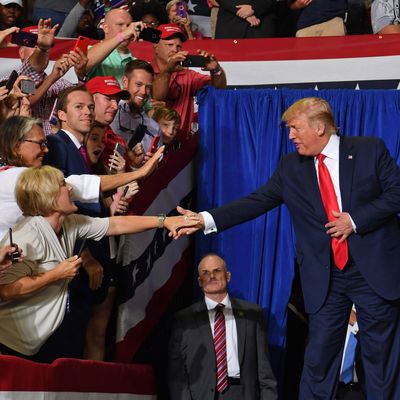
If there has been one bit of conventional wisdom about 2020 that has most comforted left-of-center analysts like me, it’s that Donald Trump’s job approval ratings seem exceptionally stagnant and too low to support the evident optimism of his conservative media boosters. I made that argument just a few days ago in a piece looking at evidence that Trump’s actual voting appeal may not be much better than those shaky approval ratings.
But now comes the formidable number cruncher Nate Cohn with a challenge to this assumption from a couple of different directions. It will be received by many Times readers as something of a terroristic threat, but it’s important to face it directly.
First up, he calls attention to something most of us have ignored since Trump took office: the president’s personal favorability ratings. Yes, we all know that Trump won despite astonishingly low favorability numbers (an Election Eve ratio of 36/61 according to Gallup). But Cohn notes these numbers now look better for POTUS:
Millions of Americans who did not like the president in 2016 now say they do. Over all, his personal favorability rating has increased by about 10 percentage points among registered voters since Election Day 2016, to 44 percent from 34 percent, according to Upshot estimates.
That is still well under a majority, though not far below the 45.9 percent of the popular vote he won in 2016. But more important, Cohn suggests, a lot of these voters who have a newly favorable view of Trump may not have voted for him last time around:
Republicans with an unfavorable opinion of Mr. Trump were more than twice as likely to stay home on Election Day as those with a favorable view, according to New York Times/Siena surveys of North Carolina, Florida and Pennsylvania in 2016.
It seems likely that a substantial number of these voters now have a favorable view of the president: Over all, 28 percent of Republican-leaning voters with an unfavorable view of Mr. Trump in 2016 had a favorable view of him by 2018, according to data from the Voter Study Group.
Cohn acknowledges that the odds are pretty good Democrats will nominate a more popular opponent for Trump than Hillary Clinton was in 2016, though nobody knows how she or he will compare to the president in personal favorability. I think it’s pretty important to remember that Trump won among the 18 percent of the electorate who disliked both candidates by a robust 47/30 margin, which could reflect either relative unfavorability or the natural tendency of unhappy voters to support change (which would be my guess). The latter explanation would be bad news for Trump as the incumbent.
In any event, Cohn concedes that presidential job approval ratings are more relevant to a president’s reelection prospects, and makes two separate arguments about them. The first is that Trump’s job approval ratings have been rising since the end of the government shutdown this year. While this is true, they were clearly depressed by the government shutdown, just as they were when Republicans were trying to kill Obamacare. Without question, when Trump is supervising one of his party’s least-popular policies or tactics, he will suffer. But if his approval ratings have rebounded to their natural state, that’s not a sign they will continue to rise to that of presidents who are cruising toward reelection. According to Gallup last month, Trump’s approval rating was at 42 percent, just two points above the average approval rating for his presidency. The average approval rating for modern elected presidents in their tenth quarter is 54 percent. It’s not at all clear Trump is showing much progress in “normalizing” his popularity.
Cohn’s second argument is one that only data dogs like himself are much in a position to contest:
In some periods over the last few months, his job approval rating increased to among the highest levels of his term, according to live-interview telephone polls, long considered the gold standard of public opinion research …. Curiously, online polls have not shown this same increase; in fact, they’ve shown no increase at all.
Trump’s relative strength in online polls prior to the 2016 election was the basis for the “shy Trump voter” hypothesis holding that voters embarrassed to tell potentially disapproving interviewers they were MAGA people gave Trump some of the hidden strength he showed at the polls. So as Cohn suggests, the new inverse live/online gap undermines that theory. What else it might mean is beyond my ken.
In any event, even if you buy Cohn’s argument that Trump is near the ceiling of his narrow band of job approval numbers, there’s no evidence he’s about to bust right through it. Some observers seem to think that a steadily improving economy will save him, but aside from the possibility of bad economic events occurring, it’s important to remember that solid majorities of Americans continue to express unhappiness with the general direction of the country. There’s really no reason to assume that incumbency is going to help Trump more than it hurts him. As Kyle Kondik noted recently, there’s increasing evidence from trial heats testing Trump against Democrats that his performance will undershoot, not exceed, his approval ratings.
From a longer perspective, my guess is that the narrow band of favorability and job approval numbers for Trump is just another testament to the partisan polarization that made it possible for him to win in 2016, despite his unpopularity. He cannot fall too far, even when he’s behaving in his signature beastly manner, because Republicans will sustain him. But he’s the wrong figure to expand his party’s base, having already pretty much maxed out with those residual white working-class conservative independents and Democrats he so famously won over in 2016. Sure, we all understand there are circumstances under which he can transcend his many handicaps by demonizing his opponent, revving up the MAGA people, and taking advantage of an Electoral College system which does not weigh popular votes equally. But having thought through Cohn’s argument, I’m less terrified than when I read his tweets and fear he has stumbled into some pro-Trump breakthrough.






























